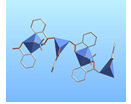 |
|
 |
|
 |
|
 |
|
 |
|
 |
|
 |
|
Departmental Guidelines on Oral Presentations and Written
Reports for Chem 395
![]()
Oral Presentations
Oral presentations are the major form of dissemination of newly acquired scientific data. Research students must become comfortable with this type of presentation. As indicated above, students will give two oral presentations during the semester.
Scientific presentations should be in the form of transparencies or a computer presentation. The best presentations will consist mainly of diagrams or figures, and have only minimal words (for instance, an outline of the major points). You will be describing your research orally, so there is no need to clutter your slides with the exact words you will say (these should be in your notes). Diagrams and figures should be carefully prepared and professional in nature. The tools in ChemDraw can be used to create not only chemical structures but also a variety of other types of figures. For some kinds of figures, Photoshop may also be useful. Be certain that the font used in your presentation is at least 14 pt so that the audience can see it readily. PowerPoint display of extensive tables of tiny numbers is useless to your listeners. If you have a great deal of data to present, be creative in how you break it down and display it. In some cases, extensive numerical or complex data will be more useful in the form of handouts for your audience. Choose backgrounds carefully - many times the backgrounds provided in PowerPoint actually make it more difficult to see your data and figures. In general, don't get carried away with the fancy features of PowerPoint or similar programs. Fancy transitions are not a substitute for a well-thought-out presentation based upon solid work!
Each presentation should include a brief summary of essential background information, highlighting only the most relevant and pertinent facts. If you are new to a project, it is appropriate to spend a bit more time on the introduction. If you are reporting for the "nth" time on an ongoing project, the introductory material should be kept minimal (focus instead on your new results). After presenting the context and justification for your research (the background), you should turn to a description of the specific goals of your research. The bulk of your presentation should follow from this point, as you discuss your methods, results, and interpretation. Finally, one generally closes by giving the audience a sense of what's next in the project. Plan your presentation and practice it to ensure that you can carry it out in the alloted 10 or 15 minute time.
Be prepared to field questions from your audience both during and after your presentation. Faculty will ask you questions to test your comprehension of your research. Some of these questions will test your knowledge of basic facts relevant to your research, for example about background information or equipment you used. Other questions will probe your understanding of your research at a deeper level. These might, for instance, involve asking why you chose a particular method to investigate your experimental question, or you could be asked to consider alternate interpretations of your results. We generally allow about 5 minutes for questions.
Written Reports
All Chem 395 students are expected to prepare a written research report. The exact nature of this report is up to the research supervisor, however, generally, the report should follow ACS guidelines (see your advisor and the ACS Style Guide for details). The length of the report should be appropriate for the project and the credit awarded. Well-written reports may serve as the basis for a thesis in a subsequent semester (writing a thesis is reserved for those students who complete a substantial amount of research).
Evaluation
Students will be evaluated on
- Their depth of understanding of the project. What are the goals of their specific project and how does it fit into the greater picture of research in the field?
- Their knowledge of the relevant literature.
- Their ability to independently solve problems that arise during the project, design experiments to answer the question at hand, and analyze data and reach conclusions.
- Their understanding of the research methods used in the project and their ability to use those methods effectively.
- Their ability to use quantitative, statistical or mathematical models
to evaluate their data as appropriate for the project.
The quality of oral and written presentations including content, organization, clarity, style, and professionalism.
Evaluation will be based on the oral and written reports and observations by the faculty advisor during the semester. Expectations will generally increase as students continue research over multiple semesters or summers.
| DePauw University | ||||